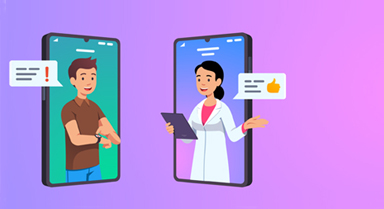The good news is that through early detection and effective treatment, the negative effects of certain chronic conditions can be minimized. In fact, learning how to manage a chronic condition by addressing problems early on and making informed decisions about your health and wellness can help you live a longer and healthier life.
Did you know?
- Noncommunicable diseases (NCDs), also known as chronic diseases, kill 41 million people each year, equivalent to 74% of all deaths globally. 2
- Each year, 17 million people die from a NCD before age 70; 86% of these premature deaths occur in low- and middle-income countries. 2
- Of all NCD deaths, 77% are in low- and middle-income countries. 2
- Cardiovascular diseases account for most NCD deaths, or 17.9 million people annually, followed by cancers (9.3 million), chronic respiratory diseases (4.1 million) and diabetes (2.0 million including kidney disease deaths caused by diabetes). 2
Managing heart disease
Altering your lifestyle can help lower blood pressure levels and reduce the risk of associated conditions. Watching your weight, getting regular exercise, eating well, limiting alcohol, reducing salt levels, drinking less caffeine, avoiding smoking and reducing and managing mental stress can all help.3,4,5 If diagnosed with high blood pressure, your doctor may recommend that you take medicine to treat it.
If lifestyle changes alone don't work, medications may be needed to control heart disease symptoms and to prevent complications. The type of medication used depends on the type of heart disease. 4
Managing diabetes
Diabetes increases the risk of falling ill, as the increased blood sugar levels associated with certain illnesses can worsen the symptoms. Therefore it is more challenging for the immune system to fight off. Follow these additional steps when you’re sick even if your blood sugar is within your target range:
- Continue taking your insulin and diabetes pills as usual. 6
- Test your blood sugar every four hours and keep track of the results. 6
- Drink extra calorie-free liquids, and try to eat as you normally would. 6
- Weigh yourself every day. Losing weight without trying is a sign of high blood glucose. 6
- Check your temperature every morning and evening. A fever may be a sign of infection. 6
Always speak to your doctor if you are not sure about what to do, or if you have any questions concerning your condition or medications. If you need to go to the hospital for any reason, mention you have diabetes as soon as possible.
Managing cancer
Cancer is a complex chronic condition to manage, as there are so many different factors to consider – including the type of cancer as well as the stage. Treatment, including chemotherapy, radiation, immunotherapy and targeted treatment might be needed, depending on the stage of cancer.7
Finding out that you have cancer can be a devastating experience. It is normal to feel scared, worried, and overwhelmed. That’s why, apart from understanding the treatment side of this chronic condition, it’s important to consider the following:
- Get support from family and friends. It will be difficult telling those close to you that you have cancer. However, the support and assistance they can offer is likely to be of great help to you.
- Talk to other people with cancer. You may find that it helps to speak to other people who have or have had cancer. These may be friends or relations, or members of cancer support groups or societies. There might be people nearby who you can talk to, or perhaps you could consider joining online support networks.
- Take time for yourself. Understanding and absorbing the information you’ve received is a process. Give yourself time to think it through, realize what it means, and come to terms with how it will affect your life. Make looking after yourself and getting what you need a priority.
- Maintain your lifestyle. Take it one day at a time. Continue with your life, and maintain a healthy lifestyle. Physical exercise can have a positive effect on both physical and psychological well-being.
Next steps
If you have questions about a chronic condition, contact your health care provider for advice and support.
1. Centers for Disease Control and Prevention. About Chronic Diseases. https://www.cdc.gov/chronicdisease/about/index.htm. Last reviewed July 21, 2022.
2. Noncommunicable Diseases. Key facts. https://www.who.int/news-room/fact-sheets/detail/noncommunicable-diseases#:~:text=Cardiovascular%20diseases%20account%20for%20most,disease%20deaths%20caused%20by%20diabetes. Published September 16, 2022.
3. High blood pressure (hypertension), overview. NHS. https://www.nhs.uk/conditions/high-blood-pressure-hypertension/. Last reviewed October 23, 2019.
4. Mayo Clinic. Heart disease. https://www.mayoclinic.org/diseases-conditions/heart-disease/diagnosis-treatment/drc-20353124. Published August 25, 2022.
5. Mayo Clinic. 10 ways to control high blood pressure without medication. https://www.mayoclinic.org/diseases-conditions/high-blood-pressure/in-depth/high-blood-pressure/art-20046974. Published July 12, 2022.
6. Centers for Disease Control and Prevention. Living With Diabetes. Managing Sick Days. https://www.cdc.gov/diabetes/managing/flu-sick-days.html#:~:text=Follow%20these%20additional%20steps%20when,eat%20as%20you%20normally%20would. Last reviewed February 28, 2022.
7. Mayo Clinic. Cancer treatment. https://www.mayoclinic.org/tests-procedures/cancer-treatment/about/pac-20393344. Published May 25, 2022.
This article serves only as a reference and is intended for informational purposes only. Nothing in this article constitutes legal, tax, financial planning, health or medical advice including diagnosis or treatment. Always seek the advice of your physician or other qualified health provider with any questions you may have regarding a medical condition. References to third-party organizations or companies, and/or their products, processes or services, do not constitute an endorsement or warranty thereof. Products and services may not be available in all jurisdictions and are expressly excluded where prohibited by applicable law. All group insurance policies and health benefit plans contain exclusions and limitations. For costs and details of coverage, contact a Cigna representative.
All Cigna products and services are provided exclusively by or through operating subsidiaries of Cigna Corporation, including Cigna Health and Life Insurance Company, Life Insurance Company of North America, Cigna Global Insurance Company Limited, Evernorth Care Solutions, Inc. and Evernorth Behavioral Health, Inc., or through their affiliates and contracted companies.
In the U.S., Cigna Global Health Benefits® group medical and dental plans are insured or administered by Cigna Health and Life Insurance Company. In the U.S. and Canada, group life, accident and disability plans are insured or administered by Life Insurance Company of North America. In Canada, group medical, dental, vision, and evacuation plans are insured or administered by Cigna Life Insurance Company of Canada. Employee Assistance Programs are administered by or through Evernorth Care Solutions, Inc., Evernorth Behavioral Health Inc., Inc. or affiliates and contracted companies. In other jurisdictions, products and services are offered by or through Cigna Global Insurance Company Ltd. or affiliates and contracted companies. Products and services may not be available in all jurisdictions and are expressly excluded where prohibited by applicable law. The information on this site is only a general description of benefits. All insurance policies and group benefit plans contain exclusions and limitations. Please consult your licensed agent or contact Cigna for product availability, costs, and complete details of coverage.









































































































